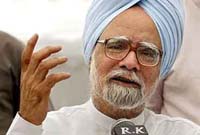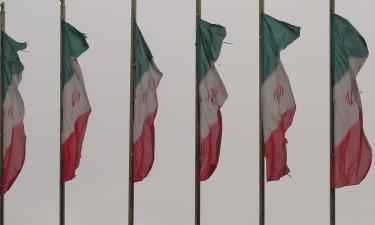Two years of Manmohan Singh
India’s shaky coalition government led by a former bureaucrat of the World Bank, Dr Manmohan Singh, has completed two years in office today (22 May) and is likely to sail through the rest of the term. The Congress party led by Sonia Gandhi has made political and electoral gains in recent times that enable it to pull off the rest of the term without hiccups. Some of the partners of the coalition, known as the United Progressive Alliance, too have improved their local base, increasing their bargaining clout with the federal government. The thesis that this makes the Congress party vulnerable has no foundation because the partners will need to support the coalition in order to wrest tax and financial concessions for their state and reinforce their electoral base.

Of all the non-Congress parties that prop up the coalition, the Left, though not a part of the government, is the strongest supporter of the alliance. Its voice has acquired greater stridency and respect after it has won back power in Kerala and demolished all opposition in West Bengal in the elections two weeks ago. There are many irritants in the Left’s relations with the government but beyond making a strong protest on issues of dispute, the Left never tried to rock the boat. As I have said in an earlier article, the government is led by the Congress party but driven by the Left.
Dr Singh is working under great stress. He has neither political nor popular following. Being a member of the upper house, he has no constituency of his own. He is not familiar with political rhetoric. He has not been able to live down the reputation that he is there because Sonia Gandhi allows him to be there. Cabinet ministers make policy statements that challenge his status as primus inter pares. The government is stable but the prime minister is not. This is an impression that refuses to go. Sonia Gandhi has a firm grip both over the party and the government. But all that can vanish if the Left chooses to withdraw its support, which it will not because that will help the Bharatiya Janata Party to come back.
Just now the Indian prime minister is valiantly struggling to douse the fires of a nationwide agitation triggered by his human resources development minister’s promise to increase the percentage of seats reserved for socially backward classes in higher educational institutions. Dr. Singh is also finding it hard to manage the resistance of the Left to any hike in the prices of petrol and diesel which is unavoidable in view of the surging global price. In short, Dr. Singh resembles more like Felicia Hemans’ “the boy stood on the burning deck” than the helmsman of a billion people.
These vagaries, however, have little or no effect on the status of time-tested Indo-Russian relations. Today, a sort of political market sense characterizes Delhi ’s foreign policy and rightly so. It has become an important ingredient in its efforts to increase the range and level of engagement with the Russian government headed by Vladimir Putin. Experts believe India’s leftist parties are expected to be more assertive, particularly on foreign policy and economic issues, after their resounding state election victories, though it's unlikely they will try to topple the country's coalition government. The Left is dominated by Marxists who are closer to China than they ever were to the Soviet Union or Russia. This factor does not visit India’s foreign policy because of the shrinking distance between Moscow and Beijing on strategic issues.
The Left is critical of the recent nuclear deal between the Indian prime minister and George Bush. But this has not come in the way of Moscow supplying 30 tonnes of nuclear fuel pellets for the Tarapur atomic power plants. India has also received from Russia the first consignment of 20-25 metric tonnes of uranium for its Nuclear Power Corporation of India. This was followed by the visit of a top Russian nuclear energy official to review the progress in the construction of Kudankulam atomic power station and to discuss the prospects of development of civil nuclear cooperation between the two countries. "With the Russian supply of 60 metric tonnes of uranium, the plants will have fuel for the next five years and run smoothly," said a high official of the Nuclear Power Corporation. Both Tarapur plants I and II have been renovated and have got the Atomic Energy Regulatory Board's license to operate for five years from February 16, 2006 and therefore, the supply by Russia was timely, said the official.
When the Indian prime minister was in Moscow last December, president Putin told him, "We consider India as our strategic partner. We will work to ensure India solves all its problems and tasks that it is addressing, including use of nuclear energy." Many Indian scribes saw the visit against the context of Dr. Singh’s meeting with George Bush before he had visited Moscow and theorized that Russia would not clearly commit itself on the supply of uranium. They were apprehensive that Russia might not be more forthcoming on India ’s civil nuclear energy programme requirements. In hindsight, these fears seem to be unfounded.
According to an understanding which now has become a tradition, the Indian prime minister and the Russian president meet every year either at Moscow or in New Delhi. Every such visit adds to the strength of their bilateral ties. Russians are happy at the Indian participation in the equity of Sakhalin I, which Dr. Singh had described as the most important of Indian investments abroad. However, the Indian side is worried about the level of bilateral trade which began showing negative trends after the collapse of the Soviet state. Both countries have now set up a study group to prepare a blueprint for boosting trade to $10 billion by 2010. In comparison, Sino-Indian trade has reached $18 billion in 2005 itself. There is every need to ensure that relations between the two countries grow beyond the strategic domain and address trade growth.
Dasu Krishnamoorty
India
Pravda.Ru
Subscribe to Pravda.Ru Telegram channel, Facebook, RSS!





